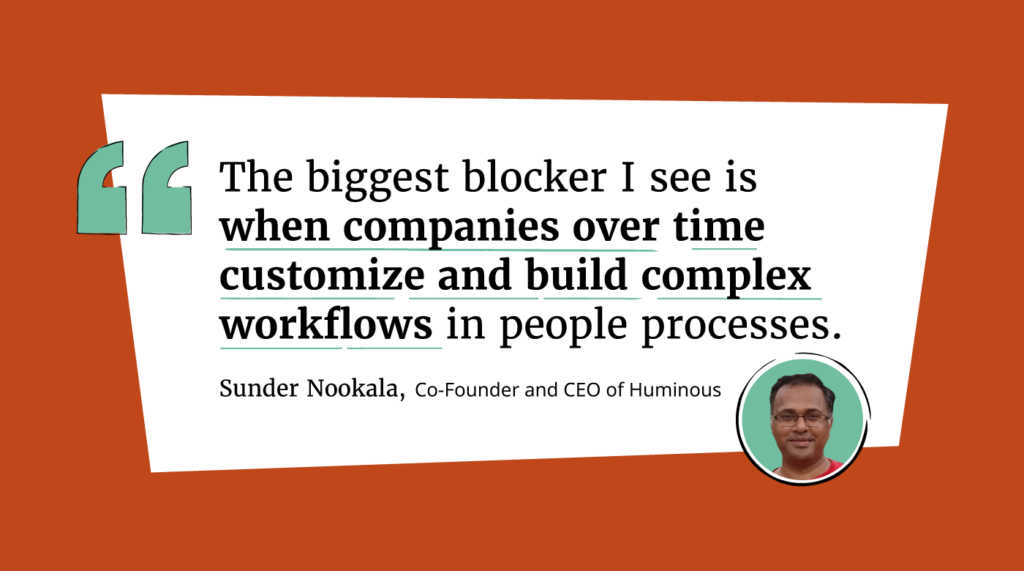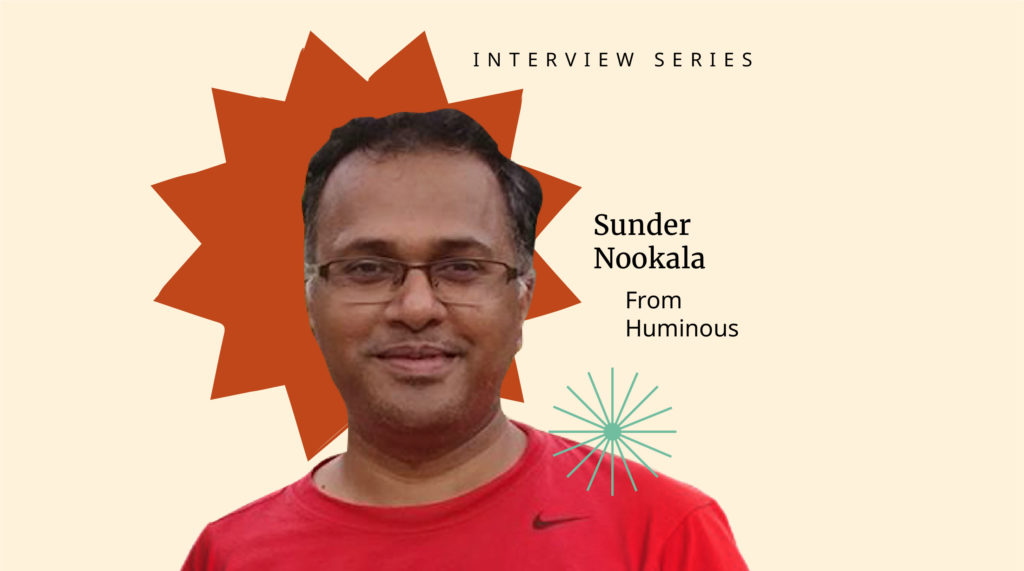We’re passionate about the world of work, and how we can make it better. To help satisfy our curiosity, we’ve launched an interview series where we pick the brains of experienced leaders, business owners, managers, and individual contributors to get their thoughts on how we can collectively build better.
We’d love to get to know you a bit better, tell us a bit about your backstory.
I am a 2x SaaS entrepreneur in the HR Tech space. My current startup, Huminos is an OKR and Growth Culture building platform. My previous startup, Kwench, was acquired by O.C. Tanner in 2019.
My entrepreneurial journey started in 2008 with Kwench and it was more of an accident. Prior to starting Kwench, I worked in IT Consulting, Corporate Finance, Treasury and Investment Banking in large companies like TCS and YES Bank.
I am also an active angel investor in startups in the SaaS space with 14 investments (11 of which have raised Series A and above and 2 are Unicorns).
If we were to ask a friend to describe your personality to us, what would they say?
Well, I am pretty certain that my friends would describe me almost quixotically :) as a passionate individual who leads from the front.
Thinking back to your career journey, what’s an interesting story that stands out?
Looking back over the past 23 years of my professional career, the one story that stands out consistently is my passion for building software products.
There is a karmic justice behind my success as a Software entrepreneur.
I am an engineer by heart and an accountant by profession.
Born and raised in a poor family, I failed to become an engineer despite getting a decent rank in the entrance test as my parents could not afford the fees. Hence, I opted for an accounting certification that charged much less but was equally good in providing job opportunities.
Though I am an accountant by profession, my whole career, I have worked with engineers, and that I believe helped me in visualization and problem-solving.
What’s the most impactful lesson you've learned over your career thus far?
I started my career in 1999 straight off-campus and joined the largest IT services company called TCS. During the early stages of my career, I had the opportunity to work with N Chandrashekaran (fondly called Chandra) then COO of TCS and now Chairman of the Tata Group, a $100 billion conglomerate.
Chandra is an avid marathon runner and on one occasion I asked him what motivates him to run. He said “It is extremely difficult to be driven and patient at the same time. Running a marathon helps me balance both”.
This lesson had a profound impact on me and I think part of my success in startups can be attributed to this lesson.
Thanks for giving us some insight into who you are! Let’s jump into things. When you hear the phrase “build a better world of work”, what comes to mind?

Let me explain further.
Conventionally, enterprises implement a system or a tool around a work process. For example, a system for employee onboarding. Typically these systems are designed for power users or admins and focus on input of many data fields, workflows or approvals, configurations, dashboards, and downloadable reports. The various elements of such a system or tool can be categorized into 4 major components:
- Core day-to-day experiences
- Configuration—rules, workflows
- Management—process adherence, exception handling
- Governance—analytics, dashboards, downloadable reports.
Any Workplace stack (a set of tools) can be imagined in 3 slivers:
- Systems of Record—records lowest level of transactions e.g. employee details like date of joining, designation, department, location etc. or customer details like billing name, billing address, billing, cash collected etc. (e.g. HRIS, CRM, ITSM tools)
- Systems of Intelligence—triggers a set of micro experiences (around a work process) that nudge an employee with a data driven, contextual call-to-action. (e.g. Huminos)
- System of Micro Experiences—platform that delivers a unified and frictionless experience of communication, collaboration, engagement and work process automation (e.g. Slack, Microsoft Teams)
A conventional tool or a system around a work process combines elements of both System of Micro Experience and System of Record albeit with a dominant focus on System of Record.
A frictionless experience shifts the paradigm from “power user centric model” to “people centric model” by delivering the “core day-to-day experiences” to the people within a System of Micro Experience thus removing the need to traverse multiple underlying tools for getting the day-to-day work done.
Let us examine further the concept of frictionless experience with an example. An enterprise ABC Inc. intends to reimagine its employee onboarding work process and wishes to deliver the core experience on its SOE without implementing another off-the-shelf tool. ABC Inc. has ~5000 employees and its current stack includes.
- SOR—Workday (HRMS)
- SOE—Slack
Reimagining the employee onboarding work process, an illustrative list of frictional micro experiences for normal users include:
- Welcome message from HR
- Introduction to team members
- Schedule 1:1 meeting with manager
- Schedule a task (for the IT team) to setup laptop with relevant access
- Nano learning courses for company values, culture, policies etc.
- Assessment for the above learning courses
- 30d, 60d, 90d engagement check-ins through pulse surveys
- Appreciative and developmental feedback from team members
- …and more
We can actually visualize the frictionless micro experiences across the hire-to-retire cycle.
For you, what’s the main blocker you see as standing in the way of building a better world of work?
I have been working in the HR Tech space for over 2 decades now and the workplace tools have changed a lot over this time.

There is an urgent need to strip these complex workflows into “a set of micro experiences” that can be seamlessly delivered and consumed on your favorite tool like Slack or Microsoft Teams.
What’s one thing within our control that we can practically do to build a better world of work today? And, how do you recommend going about it?
The one thing that we can practically do to build a better world of work is to re-imagine the hire-to-retire processes and simplify them so that work can meet the worker at his or her favorite place instead of forcing the worker to traverse multiple systems to get his or her work done.
For example, let’s examine goal setting and performance evaluation processes: Modern System of Intelligence like Huminos enable completion of day to day tasks like progress check-ins, scheduling 1:1 conversations, giving or receiving appreciative and developmental feedback, etc. can be done within Slack or Microsoft Teams without switching to another software application.
Can you share one thing you’ve experienced, seen, or read about that is leading us towards a better world of work?
System of Micro Experience is all-permeating within an organization whereas a System of Record is designed for an administrator or power user. Stock markets are rewarding Systems of Experience (e.g. ServiceNow) and Punishing Systems of Record (e.g. Workday).
Josh Bersin too argues in this article that employee experience is the core.
I’m curious, thinking about building a better world of work, is there a company and/or leader who stands out to you as someone we should follow? If so, what are they up to?
Building a better world of work is a top priority for many leading tech companies.
Salesforce, a System of Record, has acquired Slack and validated the importance of a System of Experience.
Microsoft with its Office Suite as a System of Record has seen huge success with Teams as a System of Experience.
I particularly look at ServiceNow and expect it to either launch or make some acquisitions in the near future to amp up its Experience play.
How can our readers follow your work?
Readers can generally follow me on LinkedIn (or) OKR-Bytes where I write about OKRs applying first principles of Physics (or) anyone interested in building a better world of work should read my 4-part series on New Enterprise Stack.
Thank you for adding your voice to People Managing People’s interview series on How to Build a Better World of Work!
Want To Add Your Voice To The Conversation?
Join our interview series and share your ideas for how we can build a better world of work!
Related Read: How To Create A Thriving Culture Of Learning
Worth Checking Out: Goal Setting Software for Keeping Teams On Track

